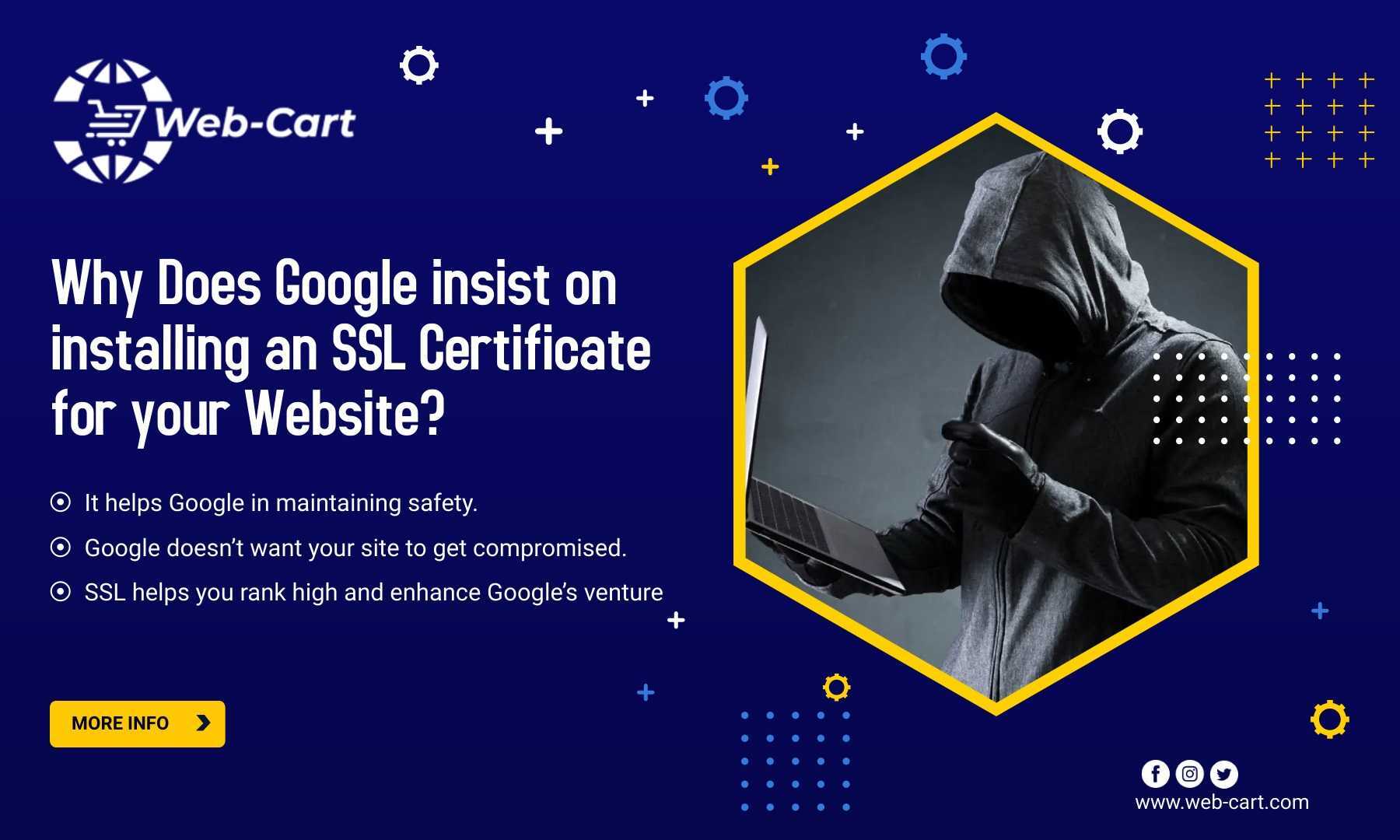
Why Does Google insist on installing an SSL Certificate for your Website?
Website security is one of the major concerns for businesses in 2021.
Still, 43% of small businesses do not have any cybersecurity protocol installed on their site.
This is alarming given the fact that experts have repeatedly warned that no business is safe from cyberattacks.
Security protocols like an SSL certificate or a firewall are designed to protect your connection from cyberattacks.
But some business owners do not seem to understand its importance. That is why today, we will help you understand their significance. Let’s start by first understanding what exactly an SSL is:
What is an SSL?
An SSL or Secure Socket Layer certificate is a standard security protocol that creates an encrypted connection between the web server and the browser. The data of two communicating entities is passed on a secure network so that no hacker can see what is being transferred. An SSL encrypted website uses Hypertext Transfer Protocol Secure connection that depicts security to the users by displaying a gray padlock ahead of your website’s URL. Without the SSL, the communication between your customer and your server can be easily traced and manipulated as it will pass in a plain text format.
Types of SSL certificate
- Single domain certs
Single domain certs are the ones that can only protect a single domain or subdomain at a given time. - Wildcard certs
Wildcard SSL certs can protect the chosen main domain along with its unlimited first-level subdomains. They are issued to the chosen domain (SAN) with a wildcard character (*) in the hostname. This secures multiple first-level subdomains beneath it.
For example, a wildcard can protect www.domain.com (primary domain) and support.domain.com and blog.domain.com (subdomains) but cannot protect www.xyz.support.domain.com. - Multi-domain SSL
Multi-domain SSL certs can secure multiple domains or subdomains (Subject Alternate Names) up to 250, varying from provider to provider.
Before issuing you an SSL, the Certificate Authority will validate your domain and the organization’s identity that you wish to validate. So, here are all the validation levels you may choose to go through based on your requirements:
- Domain Validation
To obtain a DV SSL, your domain ownership is ascertained. This validation is cheap and best if you have a blog or a small business portfolio website that does not involve monetary transactions and sharing customer PII.
- Organization Validation
An OV SSL cannot be obtained just by proving that you are a credible person. Instead, you will have to confirm that your business is also credible enough to be protected. The CA may contact your business, asking you a few questions about it so that they can mention your business’s name and address to make it look more credible.
Extended Validation
An EV SSL is tough to obtain and is the most robust validation process. To obtain it, an organization has to prove that they are legally registered and have a physical presence on the address. Under this validation, your business goes through a full background check. In addition, large enterprises such as e-Commerce websites and financial institutions must have an EV SSL installed on their site to ensure optimum customer trust.
Why does Google want you to have an SSL installed?
It helps Google in maintaining safety.
Google is sick of getting accused of the cybersecurity problem all the time.
Now, It has finally found a solution. Google now wants every website owner to install an SSL so that their connection can be encrypted, and no hacker can manipulate the data.
SSL is no longer a recommendation; it is a mandatory thing. You must have an SSL if you want to stand a chance against your competition.
Google is ranking SSL-encrypted sites higher than the non-SSL ones so that people install them forcefully and appropriate safety can be maintained across the internet.
Google doesn’t want your site to get compromised.
A cyberattack is a blow to your website and Google too.
Wondering how?
Well, if businesses keep getting compromised on Google, the traction will decrease. More minor companies will likely open their eCommerce stores and blogs on Google.
The search engine giant is always worried about cyberattacks. So, it keeps updating its algorithm from time to time so that people can venture peacefully.
If cyber-attacks keep happening, businesses will lose their trust in the search engine, blowing Google’s overall reputation.
SSL helps you rank high and enhance Google’s venture
If search ranking is one of your top concerns, this certificate can help you get better search rankings.
Whether it is about Google’s 2018 update or 2021 Page Experience Update, it has been mentioned that SSL will be a ranking factor.
Google marginalizes non-SSL websites by displaying a Not Secure sign ahead of their URL (Let alone ranking on the top of SERP).
Having said all of this, you must be wondering which SSL should I buy then?
Well, let us tell you that Comodo provides the best-in-class and affordable SSL certs. So, you can buy any comodo SSL like regular SSL, Comodo Essential SSLor any other type of SSL and rest assured of your website’s safety.
Google also derives extensive benefits from your rankings. For example, when users search for your website, they use Google giving more opportunities to Google to display ads and promote products to your users.
To Conclude
With all said and done, you must have understood the value an SSL holds for your website.
Without it, you cannot imagine the safe and smooth passage of business online. Neither Google nor your customers will value you. So, to give your business a safe online presence, install an SSL cert today.